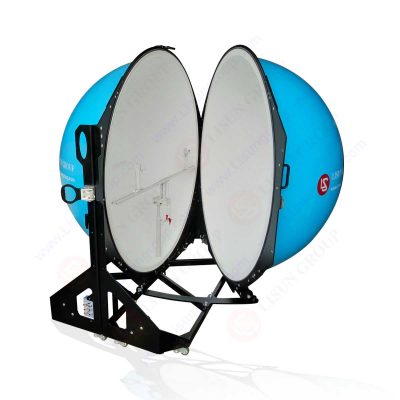Integral sphere measurement system is the most common light color measurement equipment in the luminaire industry, and its measurement results can meet the needs of most product development and testing, which is a relatively economical measurement method. The following is a brief introduction to the working principle of the integrating sphere measurement system and its measuring method of the integrating sphere in LED lighting products.
The basic principle of the integrating sphere is that the light is collected by the integrating sphere through the sampling port, and is very evenly scattered inside the integrating sphere after multiple reflections inside the integrating sphere. When using the integrating sphere to measure the luminous flux, the measurement results can be made more reliable, and the integrating sphere can reduce and remove the measurement error caused by the difference in the shape of the light, the divergence angle, and the response at different locations on the detector.

Measuring principle of the integrating sphere:
In the process of light source testing, the main function of the integrating sphere is to be used as a light collector and is an important component of the photometric measurement system, the integrating sphere is a hollow sphere, the shell is generally welded by sheet metal or integrally rotated, and the inner wall is sprayed with reflective paint.
Due to the high band gap of the coating material on the inner wall of the integrating sphere, there is almost no absorption of light energy, so there is no light loss. When the light source to be measured is installed in the center of the integrating sphere, the light is evenly distributed on the inner wall of the ball after multiple reflections and diffuse reflections in the ball. By measuring the light energy of a small area of the inner wall of the integrating sphere, the total light energy emitted by the light source can be calculated.
According to the different photometric measuring equipment, the integrating sphere measurement system is divided into two categories: integrating sphere photometer measurement system and integrating sphere spectral analysis system. The former uses a photometric probe as a detector to measure light parameters with a photometer; the latter uses optical fibers to collect the light from the wall of the ball, and cooperates with a spectrometer to measure parameters such as luminosity, color and radioactivity
Types of luminaires tested under different test methods of integrating spheres:
In the process of integrating spheres test, according to the different types of light sources, the installation position of the installation light source is also different in the test process, and the most commonly used test methods are the following two test methods, the integrating spheres 4π and the integrating spheres 2π two test methods.
Integrating sphere 4πmeasurement method: The light source under test is installed in the center of the integrating sphere and emits light in all directions. When using this measurement method, the sample installation is simple and the time to change the sample is short, but the effect of self-priming effect needs to be considered.
Integrating sphere 2π measurement method: The light source to be measured is mounted on the opening of the sphere wall on the side of the integrating sphere, allowing light to enter the integrating sphere from the outside. This measurement method does not need to consider the effect of self-priming effects, but needs to be configured with aperture reduction device to accommodate sample sizes.
Scope of application:
Integrating sphere 4π measurement method: bulb lamp, corn lamp, candle lamp, T series fluorescent tube, etc. are more suitable;
Integrating sphere 2π measurement method: downlights, spotlights, ceiling lamps, flood lights, etc. are more suitable.
Difficulties in testing the application of the integrating sphere at 2π:
2π (integrating sphere side opening test, difficult to fix the lamp under test, light leakage, standard lamp calibration method)
Due to the LED street luminaries developed, it is hard to do 4π geometry test in the traditional integrating sphere. Because there is no test base (platform) to hold so heavy LED outdoor lighting fixtures. LISUN IS-*MA Optical 4π Geometry Integrating Sphere With Holder Base is designed for this kind of LED luminaires.

IS-*MA Integrating Sphere T8/T5 Tube Test Holder
Lisun Instruments Limited was found by LISUN GROUP in 2003. LISUN quality system has been strictly certified by ISO9001:2015. As a CIE Membership, LISUN products are designed based on CIE, IEC and other international or national standards. All products passed CE certificate and authenticated by the third party lab.
Our main products are Goniophotometer, Integrating Sphere, Spectroradiometer, Surge Generator, ESD Simulator Guns, EMI Receiver, EMC Test Equipment, Electrical Safety Tester, Environmental Chamber, Temperature Chamber, Climate Chamber, Thermal Chamber, Salt Spray Test, Dust Test Chamber, Waterproof Test, RoHS Test (EDXRF), Glow Wire Test and Needle Flame Test.
Please feel free to contact us if you need any support.
Tech Dep: Service@Lisungroup.com, Cell/WhatsApp:+8615317907381
Sales Dep: Sales@Lisungroup.com, Cell/WhatsApp:+8618117273997
Your email address will not be published. Required fields are marked *